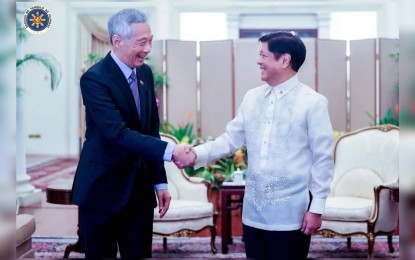
Singapore Prime Minister Lee Hsien Loong and President Ferdinand Marcos Jr. (Photo from Office of the President Facebook page)
MANILA - Senator Grace Poe requested Department of Information and Communications Technology (DICT) Secretary Ivan John Uy to regularly update the Senate on the results of the signed memorandum of understanding (MOU) between the agency and the ICT Ministry of Singapore on cybersecurity, cybercrime, cyber investigation, and cyber threats analysis.
This, after Uy told on Thursday the Senate Committee on Public Services, which is chaired by Poe, that the DICT and the ICT Ministry of Singapore will work together in upgrading the Philippines' digital response capability, as a result of the recent state visit of President Ferdinand Marcos Jr. to its Asian neighbor.
"This is the area where we actually notice that there is a serious capacity deficiency that many of our agencies are currently suffering from. Many first-world countries have already addressed these concerns through new ways of investigation and approaches. Many of these cyber scams are actually deeper than what it seems to be," Uy told Poe's committee.
Poe said she trusts the DICT to have the expertise in coming up with a system to eradicate text scams.
"I'm glad to hear that there is this agreement between Singapore and the Philippines to cooperate with each other. In terms of that, would we be able to share the technology that they have? Are they willing to give us that technology?," she asked Uy, who responded that it will be part of the actual negotiations between the two agencies.
"However, in terms of sharing know-how, sharing their expertise, experts teach our law enforcers and cyber investigators on the techniques that are being used. Those are already part of the MOU," Uy said.
Apart from the DICT's National Broadband Plan, Poe said she is also looking forward to the fruits of the agreement, saying many senators fully support it.
"We would also like to see the strengthening of the cybersecurity aspect. Obviously, they don't have the expertise in the NTC [National Telecommunications Commission] because they're more of regulators. But when it comes to the actual technical capabilities, it would be under the expertise of the DICT," she said.
Uy said Singapore is just one of the countries that the DICT is eyeing to partner with in boosting the country's cybersecurity.
"We are also in talks with several countries that are fairly advanced in tracking down cyber-terrorists and cybercrimes. Many cyber criminals are no longer lone-wolves. They are criminal syndicates that are very well-funded and international in scope and some of them are even state-sponsored. So, the approach really is not local. We need to work with other cyber law enforcers all over the world because the money trail actually goes everywhere and we need to pin them down regardless of which jurisdiction would cover it. We need those types of international cooperation," Uy said.
"I'm glad to see that you're taking a proactive stand on this. It really gives us hope that in the near future, hopefully, we will find something that's effective in protecting our subscribers," Poe said.
Poe's committee is consulting various government agencies concerned on their actions taken after numerous cases of text scams were recorded wherein even some senators were also victimized including Senate President Juan Miguel Zubiri.
She said the recent incidents call for a need to institutionalize a protection mechanism for mobile phone users in the country citing the urgent passage of the subscriber identity module card registration bill.
The lawmaker is eyeing to ratify the bill in November this year after it was vetoed by former President Rodrigo Duterte in the 18th Congress because of a provision that requires the registration of social media accounts and their users. (PNA)
